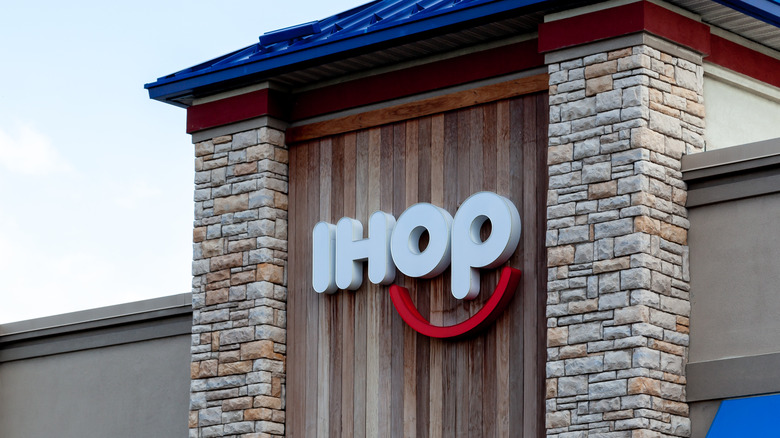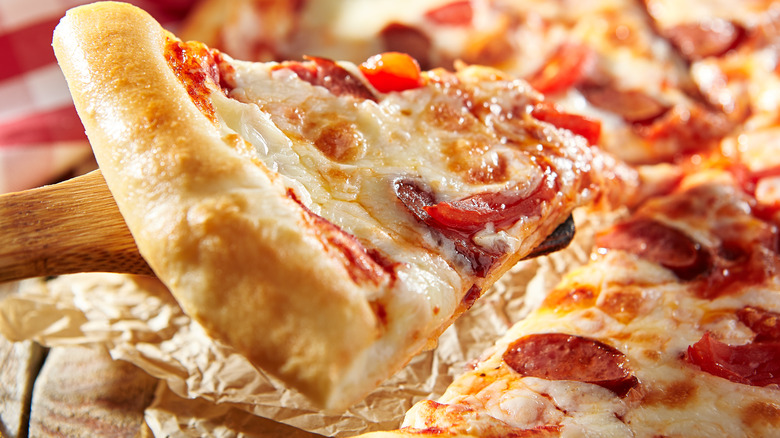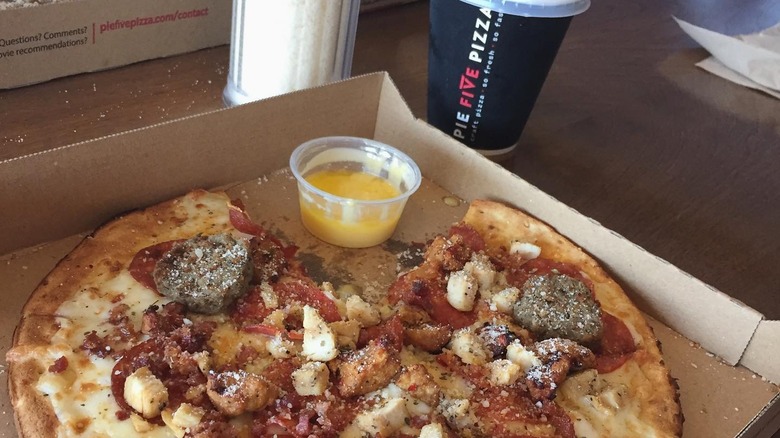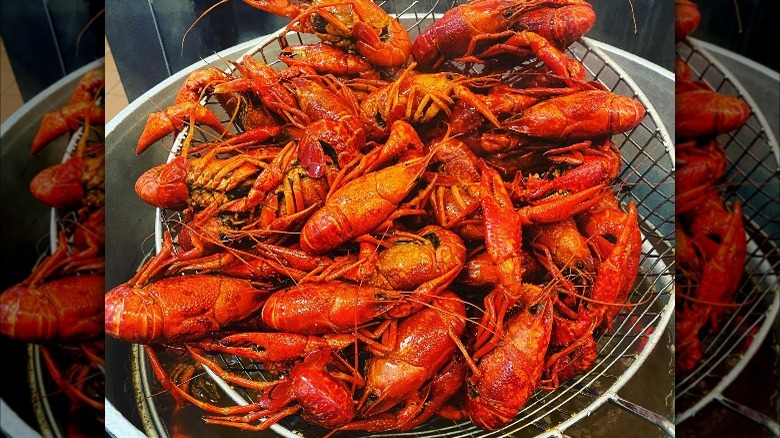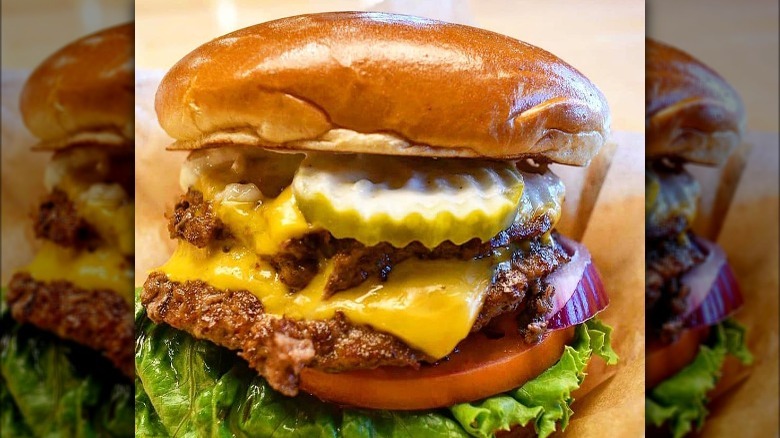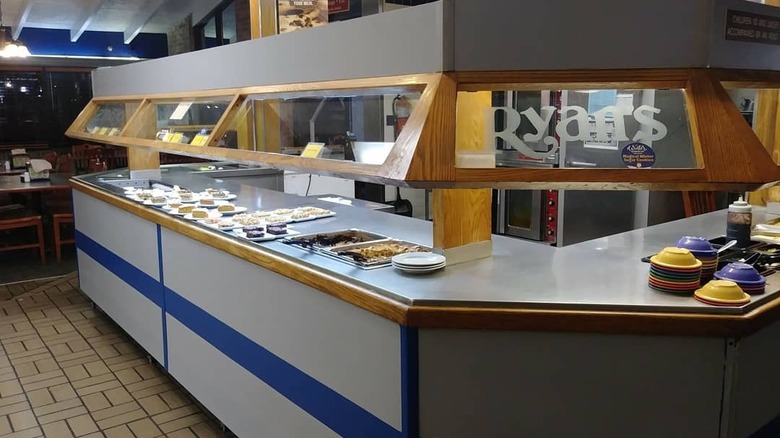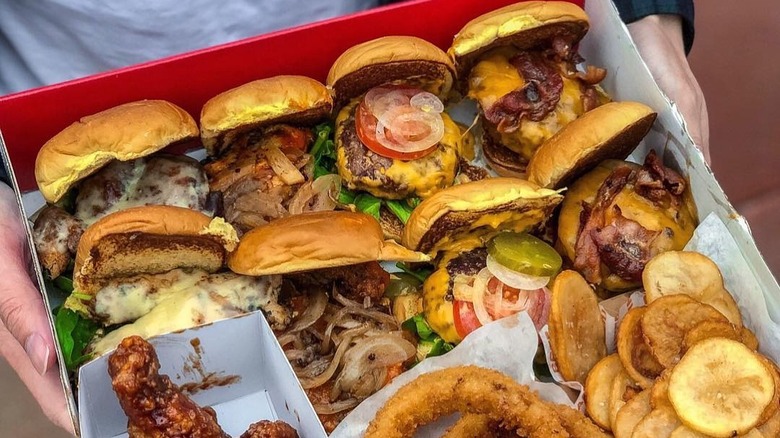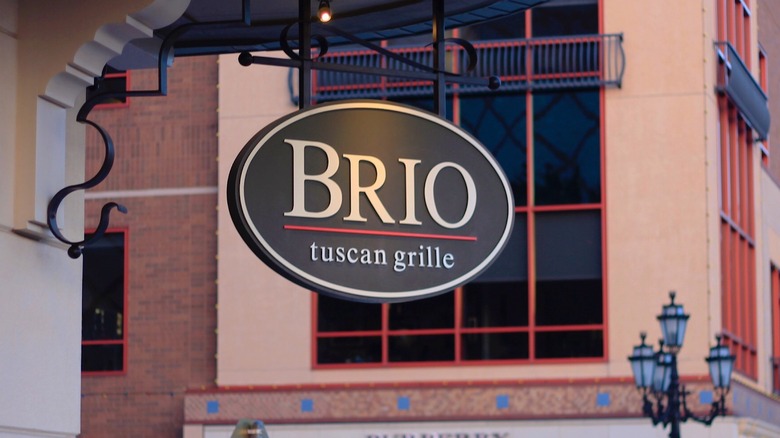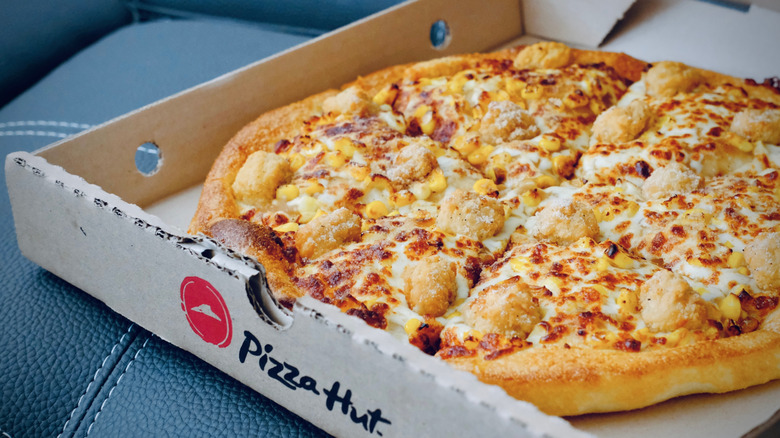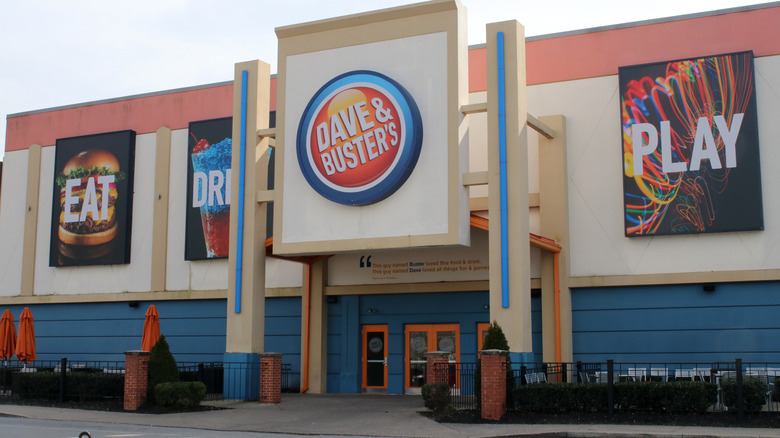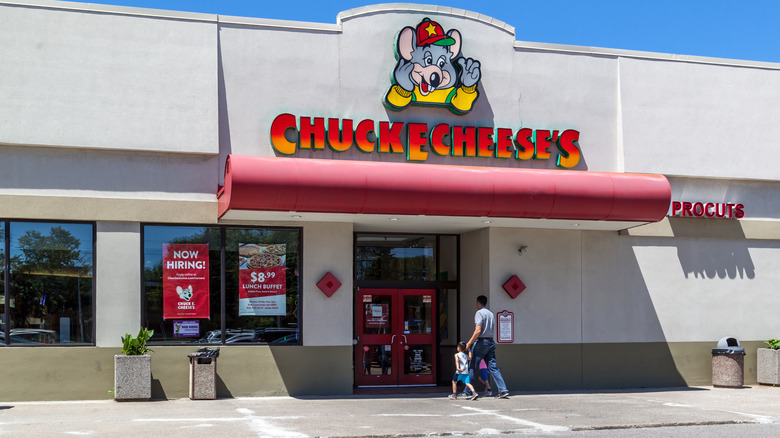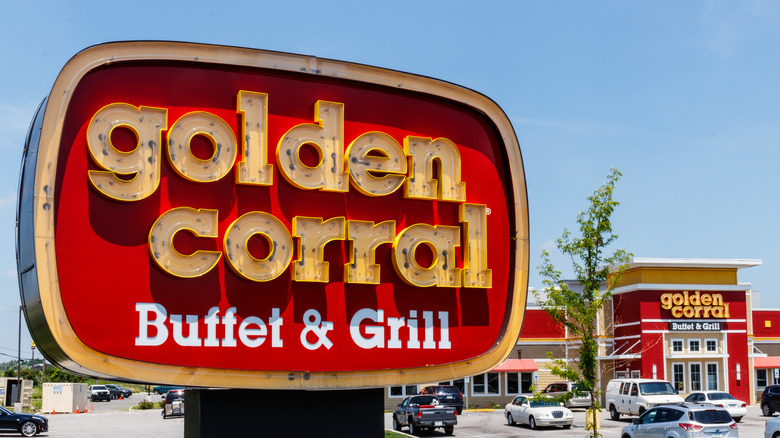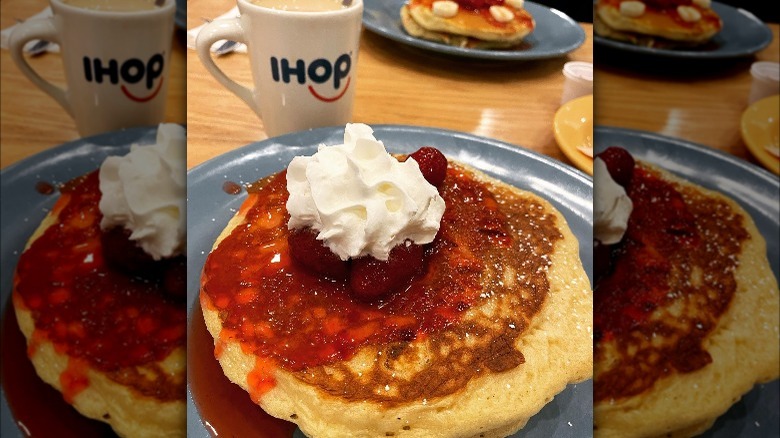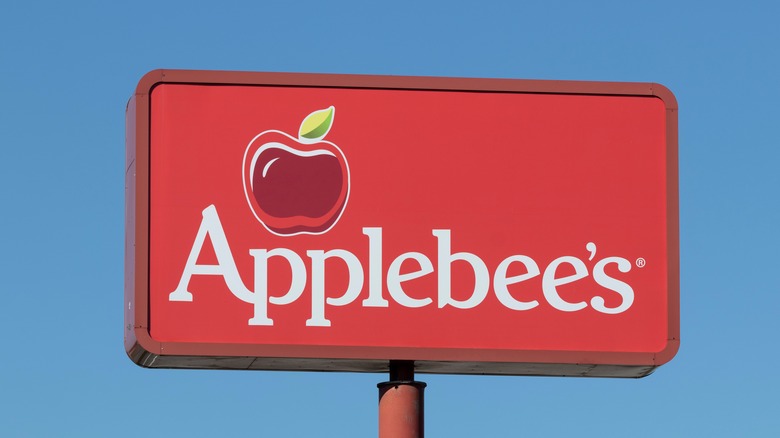Beloved Chain Restaurants We Might Sadly Lose In 2022
With most restaurants, stores, and other businesses open once more, it seems as though the world is returning to normal again after pandemic-related shutdowns. While that's good news for most of us, it might be cold comfort to the 14% of all restaurants, or more than 90,000 businesses, that closed their doors as a result of COVID-19.
From mom-and-pop diners to chain restaurants to fast-food locations, few types of restaurants were spared the effects of the pandemic. And now, almost two years from when the virus first started to spread, restaurants are still feeling the effect. Many are still struggling to recover from lost profits, pay back debts, and fill staff openings amid a labor shortage. The coast isn't clear just yet; we may still lose some more beloved chains before 2022 comes to a close.
Keep reading to learn about a few of the chain restaurants that may wind up closing in the coming year.
Pizza Inn
Founded in Dallas in 1958, Pizza Inn is mostly located in the Southern half of the U.S. Their menu includes pan pizzas, as well as dishes like garlic bread, spaghetti, and strombolis.
Like most restaurants, Pizza Inn was struck hard by the pandemic. While other pizza chains may have thrived as more and more people opted to order food to their homes, this chain's existing financial problems only worsened in 2020 and continued into 2021 (via Forbes and FSR Magazine). Per Restaurant Business Online, Pizza Inn's buffet locations were the most impacted by the pandemic.
The company had problems even before the pandemic. In 2019, the company behind the brand, Rave Restaurant Group, Inc. saw an 18.5% drop in revenue (via QSR Magazine). At the time, the chain operated 155 Pizza Inns in the U.S., as well as 48 international locations, mainly in the Middle East. Approaching the end of 2020, another 4 locations closed, as the brand saw another 8.8 percent drop in revenue. If the trend continues, Pizza Inn lovers may be looking elsewhere for their Alfredo Cheese pizzas.
Pie Five
Pizza Inn isn't the only Rave-owned pizza chain that's facing problems despite the rise in popularity of carry-out during the pandemic. Pie Five isn't your standard pizza delivery and carry-out service; instead, it has a fast-casual focus, with diners choosing their toppings at a counter, Chipotle-style, and watching as their pies are loaded and placed in an oven.
Pizza Inn and Pie Five are owned by the same parent company, and both have been struggling for several years now. Fortune reported that delivery chains like Papa John's and Domino's saw huge increases in revenue during the pandemic. Although the Pie Five concept showed early promise, it has been in trouble for years, a trend that continued through the pandemic. In 2015, the chain was opening restaurants in a variety of new states and had surpassed 100 stores (via Fast Casual). As of December 2021, per Scrape Hero, just 31 locations remain open; according to Restaurant Business Online, 10 locations were closed in a single quarter in early 2020.
The reasons for Pie Five's demise aren't necessarily a direct result of the pandemic. Instead, a variety of issues, from poor marketing to stiff competition, have no doubt contributed. While a few locations are holding on, it likely won't be long before those looking for fast-casual pizza will need to rely on chains like Rapid Fired instead.
The Lost Cajun
The Lost Cajun restaurant has been serving up Southern favorites like fried catfish, gumbo, po-boys, red beans and rice, and more since 2010 (via Forbes). Although it serves New Orleans-inspired cuisine, the chain was actually started in Frisco, Colorado. The chain was started by Louisiana native Raymond Griffin, who moved to the area at the request of his terminally-ill wife (Franchise Times via The Lost Cajun). Although it started as a tiny place with only four menu items, the chain has grown to 24 locations across 6 states.
Per Restaurant Business Online, although the chain saw early success, it was forced to file for Chapter 11 bankruptcy protection in April 2021. A drop in sales during the pandemic is to blame. Founder and owner Raymond Griffin remained optimistic, telling FSR Magazine that The Lost Cajun "ain't going nowhere." If the challenges caused by lost sales and staff shortages continue, this may not be the case.
Meatheads Burgers & Fries
The Lost Cajun is far from the only restaurant chain facing bankruptcy in 2021. Meatheads Burgers & Fries, a Chicago-based chain, declared bankruptcy in April 2021 (via Restaurant Business Online). The chain operates 13 locations in the Chicago area. They're a fast-casual concept with a menu of made-to-order burgers, hot dogs, French fries, salads, and sandwiches.
According to Yahoo!, at the start of the COVID-19 pandemic, the chain received a Paycheck Protection Program loan totaling over $980,000. In 2021, it received an additional $1.44 million in PPP funding. All of this was on top of a $6.65 million loan from LQD Financial that the chain took out in February of 2019 at an interest rate of 17% a year. In total, they owe more than $8 million to creditors.
While bankruptcy protection could help, the chain's creditors have moved to have the bankruptcy dismissed. Facing financial challenges and declining sales, this burger chain may fizzle out by the end of the year.
Ryans
When the COVID-19 pandemic first began, few restaurants were spared the effects. But one style of dining that was particularly hard-hit were buffets. Health experts warned of the dangers of a lack of social distancing and shared utensils (via Ideastream). Many buffet restaurants, unable to adjust their businesses to the new reality, decided to temporarily close until they could operate safely. Others closed their doors for good.
Ryan's, a buffet chain founded in 1978, largely shut down operations in late February and early March of 2020. Stories of Ryan's locations closing, often without warning, started hitting the news soon after. Per WCHS TV, one location in Charleston, West Virginia that had been temporarily closed since March of 2020 announced it would never reopen in October of that year.
Ryan's parent company, which also owns 5 other buffet chains, including Old Country Buffet, declared bankruptcy in early 2021. Prior to the pandemic, the company owned 90 restaurants in 27 states. As of April 2021, only 6 remained open, all of which are California locations of Tahoe Joe's. While the parent company is still in operation and could revive the Ryan's brand, it seems likely that Ryan's will wind up being a victim of the pandemic.
BurgerIM
Not so long ago, BurgerIM was a fast-growing chain taking the U.S. by storm. Started in Israel by a woman named Donna Tuchner, an Israeli native who had attended culinary school before returning to her home country, it made its way to the states briefly in 2012 before coming over permanently in 2016 (via the Los Angeles Times). The chain peddles mini 3-ounce burgers made out of beef, lamb, grilled chicken, turkey, crispy chicken, and a vegan Impossible patty. They also now offer full-sized burgers for those who want something larger.
While the chain grew fast in its early years in the U.S., its problems started before the current health crisis. One issue was its incredibly fast growth, thanks to its attractive (and possibly deceptive) franchise marketing; by the end of 2019, the brand had jumped from just a few U.S. locations to more than 1,200 franchise agreements across the nation, according to Restaurant Business Online. That same year, the brand considered filing for bankruptcy.
Now, per Eat This, Not That!, over two years later, they still haven't filed for bankruptcy, but have dropped to a little over 100 locations. After a settlement with the state of California that forced BurgerIM to refund more than $57 million in franchise fees and pay $4 million in fines, it seems the brand won't be around much longer.
Brio Tuscan Grille and Bravo Italian Kitchen
In May of 2020, it was announced that 71 locations of the popular Italian chain, BRIO Tuscan Grille and Bravo Italian Kitchen might not reopen, following temporary closures due to COVID-19 (via Nation's Restaurant News). Both chains are owned by the same parent company, FoodFirst Global Restaurants. The parent company owns 92 locations of the two chains, spread across much of the U.S.
When the pandemic struck, both chains sought to switch over to curbside pickup and delivery orders. Some locations were more successful than others; FoodFirst Global Restaurants planned to keep 21 of its most successful locations open. According to Dayton.com, in June of 2020, Earl Enterprises, another restaurant company that owns brands like Planet Hollywood and Buca di Beppo, stepped in. The new owners promised to reopen the shuttered locations, but it remains to be seen if the buy-out will be enough to keep the brands alive.
Pizza Hut
Yet another pizza restaurant struggling to keep up with the competition and changing customer preferences is Pizza Hut. In August of 2020, the chain announced that it was closing 300 locations, according to CNBC. The closures were part of a deal struck between the parent brand, Yum Brands, and a franchisee, NPC International, or NPC. Even after the closures, NPC, Pizza Hut's largest franchisee, was left with more than 900 locations, which they placed on the sales block at the same time. The franchisee owned around a fifth of the Pizza Huts in the U.S.
While things were looking bleak for the brand, in September the chain claimed that the remaining locations may be safe — at least for now (via Restaurant Business Online). Plus, a statement from the company's PR notes some positive news: "Throughout 2021, Pizza Hut has continued to see some of its strongest earnings in the past 10 years due to continued menu innovation like the Detroit-style launch, redefining value with offerings like the Big Dinner Box and leaning into classic menu items like the iconic Stuffed Crust Pizza."
Dave & Busters
As both a restaurant and an entertainment venue, Dave & Buster's faced a one-two punch as a result of COVID-19. Locations across the country closed their doors, many for months while waiting to see where health codes and the spreading virus would leave them (via the New York Post). Now, months after many restaurants, stores, and other businesses reopened, some Dave & Buster's locations are closing their doors permanently.
In the fourth quarter of 2020, the company faced a drop in same-store sales of 75 percent, according to Restaurant Business Online. They had started the quarter with 104 locations; by the end, they had just 89. The chain made headlines in September 2020 when it laid off 1,300 employees.
Per The Motley Fool, things began looking up for the chain by the summer of 2021, as they posted revenue growth for the first time since the initial closure. However, with the future course of the pandemic still uncertain, it's unclear whether Dave & Buster's would survive another shut-down or drop in visitor numbers.
Chuck E. Cheese
Dave & Buster's isn't the only entertainment complex struggling to rebound during the pandemic. In 2020, Chuck E. Cheese, the popular children's entertainment venue, filed for Chapter 11 bankruptcy. As a result, they were able to pay down more than $700 million in debt, though it's unclear yet whether that will be enough to save the '80s and '90s entertainment giant (via Nation's Restaurant News).
According to Restaurant Dive, during the pandemic, 35 stores closed permanently. Per Today, the chain tried to adjust to the closures by offering pizzas and other carry-out-friendly foods for curbside pickup under the name Pasqually's Pizza & Wings.
In 2007, the brand celebrated 30 years of fun. Now, it seems that fun may be coming to an end. This means that future generations of children will grow up without ever knowing what it was like to celebrate your birthday lost in a tube slide or doing a singalong with a larger-than-life rat.
Golden Corral
Another buffet on the chopping block is Golden Corral. According to the company's website, this classic all-you-can-eat American buffet opened its first location in Fayetteville, North Carolina in 1973. While it actually started as a steakhouse, by the mid-1980s, it had pivoted to its signature buffet-style dining. Since then, they've been serving hungry diners piles of fried chicken, cheesy pasta, fish, and heaps of desserts — as much as they can eat!
According to Vox, In 2019, the chain had nearly 500 locations. Today, they have under 400 (via Scrape Hero). Golden Corral operates as a franchise. Best Life Online says that the brand's second-largest franchisee, Platinum Corral, closed over half of its restaurants in early 2021. Restaurant Business Online reported in 2020 that the chain's largest franchisee, 1069 Restaurant Group, filed for Chapter 11 bankruptcy protection. While some locations and franchisees continue to hold on, it seems the chain is on an inevitable downward slide.
IHOP
In October 2020, everyone's favorite late-night pancake house announced plans to close nearly 100 locations across the U.S. (via Restaurant Business Online). That was after IHOP had already closed 16 locations in the previous quarter. According to Nation's Restaurant News, in May 2020, one franchisee, which previously operated 49 IHOP locations, filed for Chapter 11 bankruptcy protection. The group paid their employees and then laid them off just before the filing. At the time, IHOP's parent company, Dine Brands, said sales were down by about 75% due to pandemic-related restrictions.
Despite a bleak outlook in 2020, things were looking up for the pancake chain in mid-2021. Per Reuters, the brand's parent company announced that it planned to hire 10,000 employees as it looked to keep up with an increase in demand. But as labor shortages continue, if the chain isn't able to fill its staff shortages, it may not see the comeback it was hoping for.
Applebee's
While their menus may have little in common, Applebee's and IHOP are actually sister brands (via Restaurant Business Online). Much like its close relative, Applebee's has faced challenges in the wake of COVID-19. Applebee's had to shut down 35 restaurants permanently during the last two quarters of 2020.
The all-American brand has been facing problems for a number of years now. Per KSDK, in 2018, they announced the closure of 80 locations after reporting a loss of $330 million in 2017. The chain had failed to update its menus and business strategy to suit a younger audience. Recognizing their mistake, Applebee's rebranded, a move that alienated the families that they once catered to. It isn't the only casual dining chain that faced similar issues; Olive Garden has also struggled to update its image and stay relevant to modern diners (via CNN). According to WLFI, sales started to recover in 2021, but it remains to be seen if the casual dining sector can bounce back from its recent struggles.
